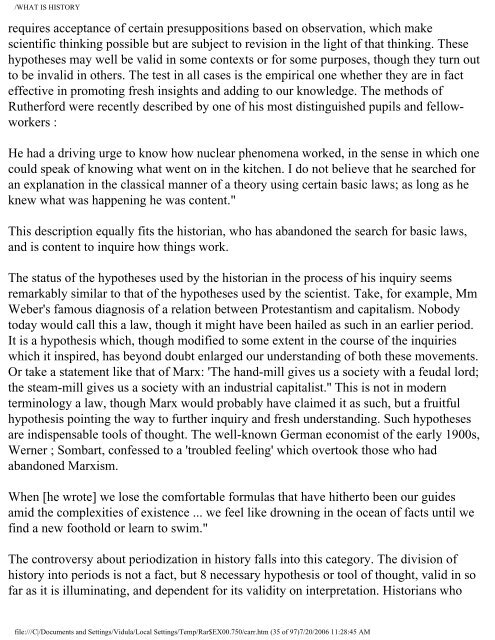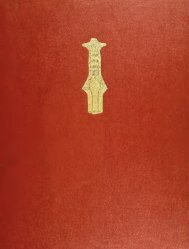What is History / by Edward Hallett Carr - Universal History Library
What is History / by Edward Hallett Carr - Universal History Library
What is History / by Edward Hallett Carr - Universal History Library
Create successful ePaper yourself
Turn your PDF publications into a flip-book with our unique Google optimized e-Paper software.
WHAT IS HISTORY<br />
requires acceptance of certain presuppositions based on observation, which make<br />
scientific thinking possible but are subject to rev<strong>is</strong>ion in the light of that thinking. These<br />
hypotheses may well be valid in some contexts or for some purposes, though they turn out<br />
to be invalid in others. The test in all cases <strong>is</strong> the empirical one whether they are in fact<br />
effective in promoting fresh insights and adding to our knowledge. The methods of<br />
Rutherford were recently described <strong>by</strong> one of h<strong>is</strong> most d<strong>is</strong>tingu<strong>is</strong>hed pupils and fellowworkers<br />
:<br />
He had a driving urge to know how nuclear phenomena worked, in the sense in which one<br />
could speak of knowing what went on in the kitchen. I do not believe that he searched for<br />
an explanation in the classical manner of a theory using certain basic laws; as long as he<br />
knew what was happening he was content."<br />
Th<strong>is</strong> description equally fits the h<strong>is</strong>torian, who has abandoned the search for basic laws,<br />
and <strong>is</strong> content to inquire how things work.<br />
The status of the hypotheses used <strong>by</strong> the h<strong>is</strong>torian in the process of h<strong>is</strong> inquiry seems<br />
remarkably similar to that of the hypotheses used <strong>by</strong> the scient<strong>is</strong>t. Take, for example, Mm<br />
Weber's famous diagnos<strong>is</strong> of a relation between Protestant<strong>is</strong>m and capital<strong>is</strong>m. Nobody<br />
today would call th<strong>is</strong> a law, though it might have been hailed as such in an earlier period.<br />
It <strong>is</strong> a hypothes<strong>is</strong> which, though modified to some extent in the course of the inquiries<br />
which it inspired, has beyond doubt enlarged our understanding of both these movements.<br />
Or take a statement like that of Marx: 'The hand-mill gives us a society with a feudal lord;<br />
the steam-mill gives us a society with an industrial capital<strong>is</strong>t.'' Th<strong>is</strong> <strong>is</strong> not in modern<br />
terminology a law, though Marx would probably have claimed it as such, but a fruitful<br />
hypothes<strong>is</strong> pointing the way to further inquiry and fresh understanding. Such hypotheses<br />
are ind<strong>is</strong>pensable tools of thought. The well-known German econom<strong>is</strong>t of the early 1900s,<br />
Werner ; Sombart, confessed to a 'troubled feeling' which overtook those who had<br />
abandoned Marx<strong>is</strong>m.<br />
When [he wrote] we lose the comfortable formulas that have hitherto been our guides<br />
amid the complexities of ex<strong>is</strong>tence ... we feel like drowning in the ocean of facts until we<br />
find a new foothold or learn to swim."<br />
The controversy about periodization in h<strong>is</strong>tory falls into th<strong>is</strong> category. The div<strong>is</strong>ion of<br />
h<strong>is</strong>tory into periods <strong>is</strong> not a fact, but 8 necessary hypothes<strong>is</strong> or tool of thought, valid in so<br />
far as it <strong>is</strong> illuminating, and dependent for its validity on interpretation. H<strong>is</strong>torians who<br />
file:///C|/Documents and Settings/Vidula/Local Settings/Temp/Rar$EX00.750/carr.htm (35 of 97)7/20/2006 11:28:45 AM







